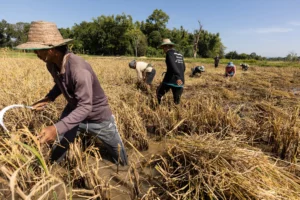On February 22, the rice and lowland grain harvest kick-off in Capão do Leão, RS, highlighted food security, drawing attention from officials, farmers, and industry groups.
The Breno Prates farm showcased both rice and, for the first time, soybean harvests, emphasizing agricultural diversity.
Alexandre Velho of the Rio Grande do Sul Rice Growers Association pointed out rice’s crucial role in over 200 local municipalities.
He requested more research funding from Governor Eduardo Leite, targeting the Rio Grandense Rice Institute (Irga), crucial for seed supply.
Velho aims for a solution by next year, praising the collaborative effort making this Brazil’s grandest harvest commencement.

Neri Geller from the Ministry of Agriculture discussed the rice sector’s technological progress and the need for international market expansion.
He highlighted federal support, like low-interest credit for producers, during his visit to discuss the agricultural chain.
Governor Leite addressed the funding request, citing losses from ICMS tax cuts but promising to find resources for Irga.
He committed to aiding entrepreneurs, especially in farming, by improving government facilitation and addressing production and infrastructure needs.
Background
Rio Grande do Sul stands as a pivotal global rice producer, contributing significantly to Brazil’s position in the international rice market.
Historically, the state’s fertile lands and temperate climate have made it ideal for rice cultivation, allowing it to produce a substantial portion of Brazil’s rice output.
This agricultural dominance not only feeds the nation but also supports global food security through exports.
The state’s investment in agricultural technology and sustainable farming practices over the years has further solidified its status.
Innovations in irrigation and crop management have increased yields, reducing environmental impact while meeting growing demand.

